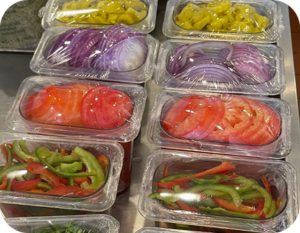Food choices affect health, energy levels, and overall wellbeing in ways that extend far beyond simple hunger satisfaction. Organic delis and juice bars offer alternatives to conventional fast food and restaurant options, providing meals prepared from ingredients free of synthetic pesticides, artificial additives, and questionable processing methods. Knowing the specific advantages these establishments provide helps explain their growing popularity among health-conscious consumers seeking convenient meal solutions without compromising quality.
Clean Ingredient Standards
Organic delis commit to sourcing ingredients that meet organic certification standards, eliminating synthetic pesticides, artificial colors, synthetic preservatives, and other chemical additives common in conventional food service. This dedication to clean ingredients means customers can trust that meals contain recognizable, wholesome components rather than lengthy lists of unfamiliar chemicals.
The absence of artificial additives matters for people sensitive to food dyes, preservatives, and flavor enhancers. Many individuals experience adverse reactions to these substances, ranging from headaches to digestive issues. Organic delis provide safe options for people avoiding these problematic ingredients.
Children particularly benefit from meals free of artificial colors and additives. Research suggests links between artificial food dyes and behavioral issues in some children. Parents seeking to minimize these exposures while providing convenient meal options find organic delis offer suitable solutions.
Nutrient Density
Meals prepared from organic produce and ingredients deliver higher levels of certain beneficial compounds compared to conventional alternatives. As discussed previously, organic fruits and vegetables contain increased antioxidant levels and often superior vitamin content. These nutritional advantages extend to prepared meals and fresh juices made from organic ingredients.
Juice bars using organic produce provide beverages with concentrated nutrients from multiple servings of fruits and vegetables. Fresh-pressed organic juices deliver vitamins, minerals, and phytonutrients in easily absorbed forms, making them efficient vehicles for nutritional support. The absence of pesticide residues in organic juices eliminates concerns about concentrated chemical exposure that can occur when juicing conventional produce.
Smoothies prepared with organic ingredients combine nutrients from whole fruits and vegetables with additions like organic yogurt, nut butters, and seeds. These balanced beverages provide substantial nutrition in convenient formats suitable for breakfast, post-workout recovery, or meal replacement when time proves limited.
Reduced Chemical Burden
Every meal presents either an opportunity to nourish the body or introduce possibly harmful substances. Choosing organic options consistently reduces lifetime exposure to pesticides and food additives. While single exposures may seem insignificant, cumulative effects over years and decades possibly affect health outcomes.
The liver and other detoxification organs process and eliminate chemicals from foods. Reducing the chemical burden through organic food choices allows these systems to function optimally without excessive demands. This proves particularly relevant for people with compromised detoxification capacity due to genetics or health conditions.
Organic delis also typically avoid processed meats containing nitrates and nitrites, preservatives linked to health concerns including cancer risk. Choosing organic options for deli meats eliminates exposure to these questionable additives.
Sustainable & Ethical Sourcing
Organic certification requirements include animal welfare standards for meat, dairy, and egg products. Organic delis serving animal products typically source from farms providing better living conditions, outdoor access, and more natural diets for livestock. This ethical approach to animal agriculture appeals to consumers who consider animal welfare when making food choices.
The environmental benefits of organic agriculture extend to deli and juice bar offerings. Supporting businesses that prioritize organic ingredients contributes to reduced pesticide pollution, healthier soil, and more sustainable farming systems. Food choices become votes for the type of agriculture society supports.
Local sourcing common among organic delis and juice bars reduces food miles and associated carbon emissions. Fresh ingredients from nearby farms require less transportation energy while supporting regional agriculture and keeping money within local economies.
Freshness & Flavor
Organic delis often prepare foods fresh daily using seasonal ingredients at peak ripeness. This commitment to freshness results in superior flavors compared to pre-made items sitting under heat lamps or in refrigerated cases for extended periods. Sandwiches assembled to order, soups made in-house, and salads prepared fresh demonstrate quality that customers can taste.
Juice bars pressing drinks on demand deliver maximum flavor and nutrition. Fresh juice oxidizes quickly after pressing, losing both taste quality and nutritional value over time. Bottled juices, even organic ones, cannot match the great flavor and nutrient content of fresh-pressed options.
The natural flavors of high-quality organic ingredients need less embellishment with salt, sugar, and artificial flavorings. Organic delis can prepare simply seasoned foods that allow ingredient quality to shine rather than masking inferior products with heavy sauces and seasonings.
Transparency & Trust
Organic delis typically embrace transparency about ingredient sources and food preparation methods. Staff can answer questions about where ingredients come from, how items get prepared, and what goes into specific dishes. This openness builds trust and helps customers make informed choices aligned with their dietary needs and values.
Many organic establishments display information about farm partners and sourcing practices, creating connections between consumers and food origins. This transparency contrasts sharply with conventional food service where ingredient sources remain mysterious and supply chains prove nearly impossible to trace.
For people managing food allergies, sensitivities, or specific dietary restrictions, the transparency at organic delis provides essential information for safe eating. Knowing exactly what goes into prepared foods eliminates uncertainty and reduces health risks.
Convenience Without Compromise
Time constraints often push people toward fast food options they know compromise health goals. Organic delis and juice bars provide convenient alternatives that save time while supporting rather than undermining wellbeing. Prepared organic meals and fresh juices accommodate busy lifestyles without the guilt and physical consequences of typical convenience foods.
Ready-to-go options including sandwiches, salads, grain bowls, and prepared entrees allow people to grab nutritious meals quickly. This convenience particularly benefits workers seeking healthy lunch options, parents managing family meals, and anyone trying to eat well despite limited time for cooking.
Supporting Digestive Health
Many people find organic foods easier to digest than conventional alternatives. The absence of pesticide residues, artificial additives, and heavy processing reduces digestive system irritation. For individuals with sensitive digestion, inflammatory bowel conditions, or food sensitivities, organic delis provide safer dining options.
Fresh juices and smoothies from juice bars offer easily digestible nutrition for people recovering from illness, managing digestive issues, or simply seeking gentle options. The concentrated nutrients in liquid form allow absorption without the digestive demands of solid foods.
Organic delis often accommodate special dietary needs including gluten-free, dairy-free, and other restrictions. This inclusivity makes them suitable dining options for people with various health conditions requiring careful food selection.
Energy & Performance
The quality of fuel put into bodies directly affects energy levels and physical performance. Organic meals provide clean energy without the crashes associated with processed foods high in refined carbohydrates and artificial ingredients. Athletes, active individuals, and anyone seeking sustained energy benefit from organic deli and juice bar options.
Green juices packed with organic vegetables provide energizing nutrients without excessive sugar. These drinks support mental clarity and physical stamina better than caffeinated beverages that provide temporary stimulation followed by crashes.
Post-workout smoothies with organic fruits, vegetables, and protein support recovery while replenishing nutrients depleted during exercise. The clean ingredients support muscle repair and energy restoration without introducing substances that hinder recovery.
Building Healthy Habits
Regular patronage of organic delis and juice bars reinforces healthy eating patterns. The convenience of these establishments removes barriers to nutritious eating, making it easier to maintain good dietary habits consistently. Over time, choosing organic prepared foods becomes automatic rather than requiring constant decision-making effort.
Exposure to various organic ingredients through deli offerings and juice combinations introduces people to new foods they might not prepare at home. This variety expands dietary diversity, which correlates with better nutritional status and health outcomes.
Community & Connection
Organic delis and juice bars often serve as community gathering places where like-minded individuals connect over shared values around food and health. These establishments foster relationships among customers, staff, and local farmers, creating social connections that make the quality of life better beyond nutrition alone.
Supporting local organic businesses strengthens communities by keeping money circulating locally and maintaining various independent retail options. The presence of thriving organic delis and juice bars indicates community commitment to health, sustainability, and local agriculture.
Investment in Health
While organic deli meals and fresh juices cost more than conventional fast food, the investment supports long-term health that may reduce future medical expenses. Viewing food as preventive medicine rather than mere fuel reframes spending on quality organic options as wise health investment rather than frivolous expense.
The immediate benefits including better energy, clearer thinking, and improved physical feeling provide returns on investment that appear quickly rather than requiring years to manifest. Many people report feeling noticeably better when eating organic prepared foods consistently compared to conventional alternatives.
For individuals prioritizing health while dealing with busy lives, organic delis and juice bars deliver solutions that honor both time constraints and wellness goals. The combination of convenience, quality, transparency, and nutritional excellence makes these establishments valuable resources for modern healthy living.







